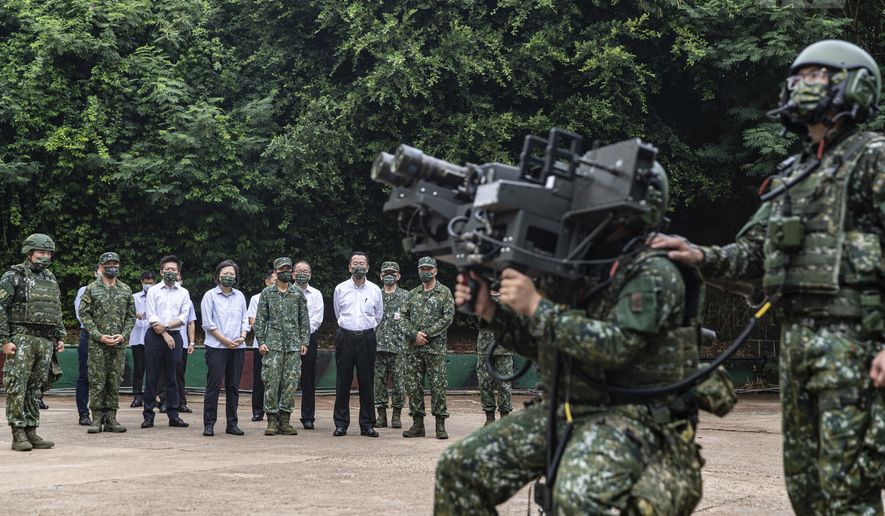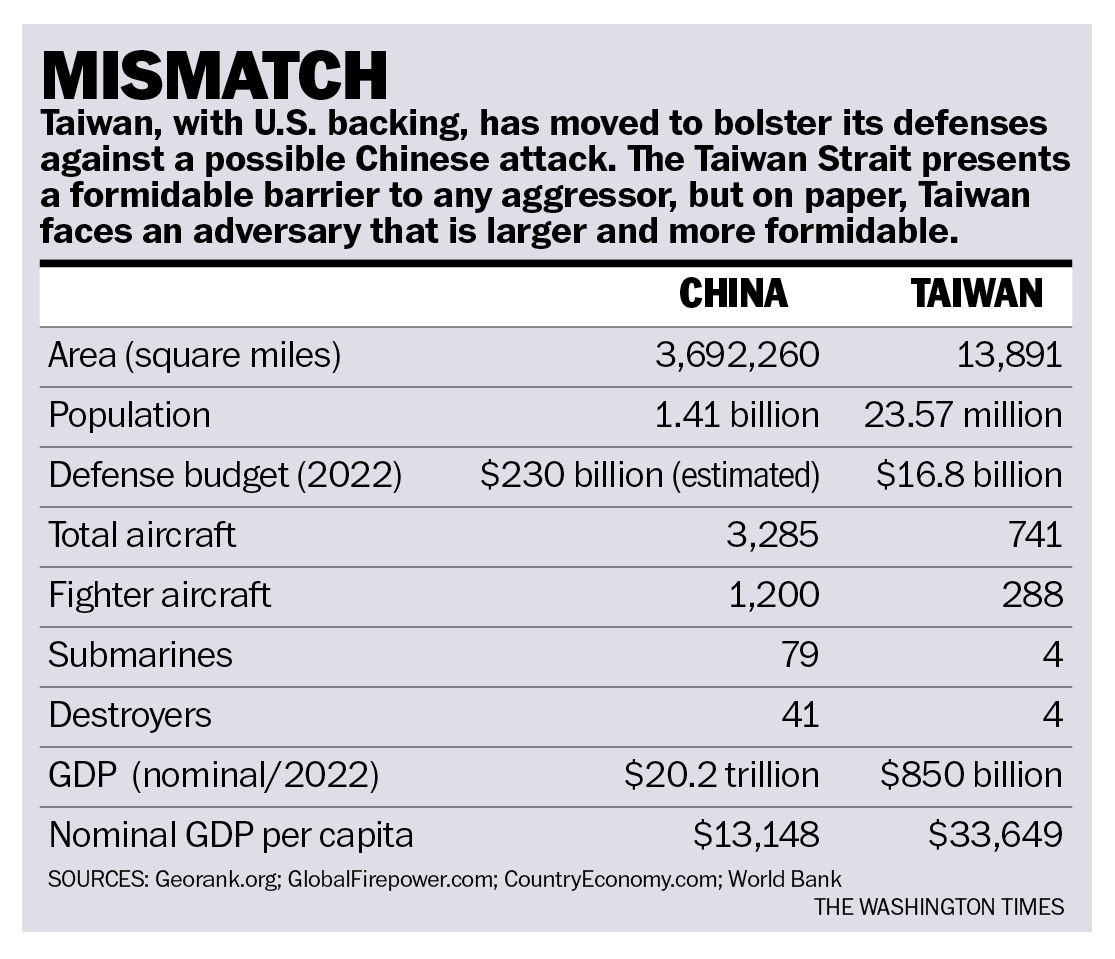The first in a three-part series, Taiwan in the Crosshairs examines how the island and its nearly 24 million people are holding up under pressure from Beijing’s stepped-up diplomatic and military intimidation campaign.
TAICHUNG, Taiwan — Elsa Lin has been doing serious soul-searching about what might become of her life and how she would respond if a once-unthinkable war with China breaks out.
“My parents think it will be better for me to leave the country if the war ever takes place,” Ms. Lin said in a recent interview. “They think if things continue to escalate, I should leave.”
The 28-year-old has lived nearly her whole life in Taiwan, and she said the island democracy flourishing around her since her childhood is too valuable to abandon.
“I am proud of being Taiwanese, and if China attacks Taiwan just like Russia did Ukraine, I fear we would lose our freedom,” Ms. Lin told The Washington Times. “If we are attacked, I will fight. I will be volunteering to fight.”
SEE ALSO: Five more years: Xi sticks to his guns as party congress opens in Beijing
She is grappling with a decision confronting Taiwan’s nearly 24 million people as Beijing increases its threat to absorb the island democracy by any means necessary, including a military invasion, to force it under the control of the Communist Party-ruled government of mainland China.
The national soul-searching has intensified since August when China dramatically expanded the scope of its military drills and missile tests near Taiwan in response to a visit by a U.S. delegation headed by House Speaker Nancy Pelosi. Many Taiwanese see the expansion of aggression as a sign that Beijing is practicing to invade.
Fears that China’s autocratic government will turn to military force seem more rational after eight months of violent imagery from Russia’s military invasion of Ukraine.
“After Ukraine, people’s mindset has changed,” said Betty Chen, a 40-year-old Taiwanese woman who works as an English-language translator for high-profile clients in Taipei.
“Seeing this example in Ukraine, we know that war can really happen,” said Ms. Chen. “Nobody wants war, but we cannot ignore the possibility, especially after Ukraine. I think we’ve become more and more aware of that.”
China’s success in ratcheting up pressure against a vibrant pro-democracy independence movement in Hong Kong in recent years has added to concerns that Beijing feels increasingly emboldened to wipe out the free political society in Taiwan.
The Chinese Communist Party has made a goal of absorbing Taiwan since the early 1950s, when American support helped the fleeing Kuomintang (Chinese Nationalist Party) of Chiang Kai-shek find sanctuary for a government in exile on the island after its defeat by Mao Zedong’s forces on the mainland. U.S. military power deterred China’s new leaders from attacking Taiwan.
Chinese President Xi Jinping has pushed the goal back into the global spotlight. In 2019, he warned that Beijing could use force to dissolve Taiwan’s democracy. The heightened military drills and China’s refusal to condemn Russia’s invasion of Ukraine have increased concern that Mr. Xi may be preparing for war.
Getting ready
Most Taiwanese say they want peace with China, and some say the island should avoid war at any cost. Regardless, the independence-leaning government of President Tsai Ing-wen, along with influential leaders of Taiwan’s economy with strong ties to both mainland China and the United States, are scrambling to prepare the island’s citizenry for a potential invasion.
“Putting it very simply, [Chinese officials] talk about it and they practice for it, and therefore the threat for Taiwan is real,” said Taiwanese Foreign Minister Joseph Wu.
“We sense it and we understand the urgency, and therefore we also try to prepare for the worst possible day to come,” Mr. Wu recently told foreign journalists visiting Taiwan through a program sponsored by the Taiwanese Ministry of Foreign Affairs.
“What we need to do is to make ourselves fully prepared so that whenever China thinks the conditions are right for them to attack against Taiwan, we are prepared and we are able to defend ourselves,” he said. “If you look at the Ukrainian people, their will to defend their freedom, they are truly inspirational to the Taiwanese people.”
Among the most inspired is Taiwanese billionaire Robert Tsao, founder of the microchip manufacturing giant United Microelectronics Corp., who has publicly pledged $100 million to bolster the island democracy’s defense.
Mr. Tsao has said in interviews that he seeks to finance advanced drone development for Taiwan’s military.
Another $31 million is being channeled into an effort to expand and improve the civilian defense force. Local-level training organizations have begun offering public courses on tying tourniquets, countering Chinese disinformation operations and other warfare skills.
Civilian defense training is at an early stage, and it’s unclear whether public interest is high enough to produce tens or hundreds of thousands of civilian soldiers — let alone integrate the force effectively with Taiwan’s national military.
Military questions
The status of and public faith in the Taiwanese military are sensitive subjects.
Since China increased military aggression in August, 59% of Taiwanese said they have confidence in the national army’s ability to defend the island in the event of a Chinese attack, according to a poll by the government-connected Institute for National Defense and Security Research.
After Mrs. Pelosi’s visit, roughly 50% of those polled said they believed the United States would send troops to help Taiwan in the event of a Chinese invasion.
The poll also found that about 41% believe the most important way for Taiwan to protect itself is to strengthen the island’s national defense capabilities.
The Tsai government has responded by pushing for a 14% increase in defense spending for the coming year, with line items for a “special” defense ministry fund and new fighter jets.
Although the increase would bring Taiwan’s annual military budget to more than $19 billion, it’s a drop in the bucket compared with the nearly $230 billion that mainland China earmarked for its military in 2022.
Some Taiwan-based observers are skeptical of the island’s defense system.
“The Taiwanese military is woefully unprepared for an invasion by China,” said Wendell Minnick, a longtime Taiwan-based American journalist covering security issues in Asia.
Critics in Washington and Taipei point to the uncertain quality of Taiwanese soldiers compared with the battle-hardened and NATO-trained troops Ukraine has deployed to counter Russian aggression.
Until August, the fear of an imminent Chinese invasion of Taiwan was receding and the mandatory term of military training and service for draftees fell from as long as two years to just four months.
At the same time, many of the big-ticket items on the Taiwanese Defense Ministry’s shopping list, such as next-generation F-16 fighter jets from the United States, may not be deployable for years.
“It’s a popular idea for the news media that Taiwan could emulate Ukraine in the event of a Chinese invasion,” said Mr. Minnick, “but it’s not accurate.”
Sea change
Many young adults in Taiwan have brought a psychological sea change in attitudes.
“The younger generation in Taiwan has more ideas about the political issues, and there are more and more people who believe that we have to stand up against China [and] prepare for war,” said Cynthia Yang, a 26-year-old professional working in the Taiwanese semiconductor manufacturing industry.
“There are a lot of activities preparing civil defense. There are civil defense organizations already,” said Ms. Yang, who spends time off work as the youth representative of the Taiwan United Nations Alliance, a nongovernmental organization whose self-described mission is to counter Chinese “bullying and coercion,” which have kept the island democracy from membership in the United Nations.
The alliance operates out of a Christian church in Taipei that hosts civilian defense training sessions.
Ms. Yang said many Taiwanese don’t want to openly declare the island as an independent, sovereign nation because they fear it will trigger a severe backlash from China.
“They are afraid of invasion from China,” she said. “They are afraid it would trigger the war directly because that’s what the Chinese government has been saying … that [Beijing] will use all means to prevent Taiwan from declaring independence.”
Ms. Yang, Ms. Lin and others say the rising Taiwanese generation represents a new kind of thinking.
“Among my friends who have a bit more education, we have a little more time to pay attention to the international situation and politics,” said Ms. Lin. Apart from a year of university study in Europe, she has lived her whole life in Taiwan. She was coming of age as political liberties flourished after the first democratic presidential elections in 1996.
“Some of Taiwan’s citizens think politics are not important — that it’s better to just live your stable life, just work and earn money,” Ms. Lin said. “But from what I know, my friends, we want a little bit more than that. We want our freedom. We know that it is important and it is special.”
“We are in Taiwan, not China. We have freedom of speech,” she said. “If China becomes more aggressive, we will fight back. We will absolutely make some noise.”
Hear Guy Taylor on the rising tensions between China, Taiwan and the U.S. on this episode of History As It Happens with Martin Di Caro.
Long a source of contention between China and the U.S., the vibrant island democracy of Taiwan finds itself once more in the geopolitical crosshairs as Beijing has stepped up its diplomatic and military intimidation campaign in recent months. In a three-part series, Washington Times National Security Team Leader Guy Taylor traveled to Taiwan to examine how the island and its nearly 24 million people are holding up under the pressure. The series of exclusive articles will look at how the Taiwanese, especially the young, are reacting to China’s intimidation campaign, how Taiwan’s world-class semiconductor chip industry plays into the crisis and how the diplomatic understandings of the “One China” policy are facing unprecedented strains on both sides of the Pacific. See the full series HERE.
• Guy Taylor can be reached at gtaylor@washingtontimes.com.







Please read our comment policy before commenting.